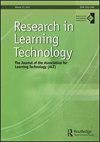Beyond description: in search of disciplinary digital capabilities through signature pedagogies
IF 1.2
Q2 EDUCATION & EDUCATIONAL RESEARCH
引用次数: 9
Abstract
The development of digital capabilities has received significant attention in higher education (HE) in recent years, with various attempts made to develop digital frameworks to support curriculum design. However, few studies have articulated these generic capabilities in terms of specific disciplines. This paper addresses the gap by exploring how digital capabilities are planned in HE curricula in two professional disciplines, engineering and management, at the two UK universities. Originality of the study is achieved in part through a newly proposed conceptual framework that weaves Shulman’s notion of signature pedagogies together with Joint Information Systems Committee (JISC)’s Digital Capability Framework (DigiCap). This study employed a multiple-case study methodology, drawing on documentary sources and academic, professional and student perspectives via interviews and focus groups. This study offers insight into the digital capabilities in engineering and management education, as well as the digital practices of engineers and managers. Findings report on which DigiCap elements are prioritised, and how, in the two professions, followed by a discussion of their most distinct ‘signature digital capabilities’. These indicate that the development of digital capabilities is aligned with the respective discipline’s signature pedagogies. This study argues that, simply just using a descriptive, typological framework is not sufficient to identify signature digital capabilities of a subject without tending to their disciplinary aspects. It is the combination of a typological DigiCap framework through the lens of signature pedagogies, which can be effective in identifying disciplinary digital capabilities. This approach is one of the major outcomes of this study.超越描述:通过签名教学法寻找学科数字能力
近年来,数字能力的发展在高等教育中受到了极大的关注,人们尝试开发各种数字框架来支持课程设计。然而,很少有研究从特定学科的角度阐述这些通用能力。本文通过探索如何在两所英国大学的工程和管理两个专业学科的高等教育课程中规划数字能力来解决这一差距。该研究的独创性部分是通过一个新提出的概念框架实现的,该框架将舒尔曼的签名教学法概念与联合信息系统委员会(JISC)的数字能力框架(DigiCap)结合在一起。本研究采用多案例研究方法,通过访谈和焦点小组,借鉴文献资料以及学术、专业和学生的观点。这项研究为工程和管理教育中的数字化能力以及工程师和管理人员的数字化实践提供了见解。调查结果报告了在这两个行业中,哪些DigiCap元素被优先考虑,以及如何优先考虑,然后讨论了他们最独特的“签名数字能力”。这些表明,数字能力的发展与各自学科的标志性教学法是一致的。本研究认为,如果不考虑学科方面,仅仅使用描述性的类型化框架是不足以识别受试者的签名数字能力的。它通过签名教学法的视角结合了一个类型学的DigiCap框架,可以有效地识别学科的数字能力。这种方法是本研究的主要成果之一。
本文章由计算机程序翻译,如有差异,请以英文原文为准。
求助全文
约1分钟内获得全文
求助全文
来源期刊

Research in Learning Technology
EDUCATION & EDUCATIONAL RESEARCH-
CiteScore
6.50
自引率
0.00%
发文量
13
审稿时长
20 weeks
 求助内容:
求助内容: 应助结果提醒方式:
应助结果提醒方式:


